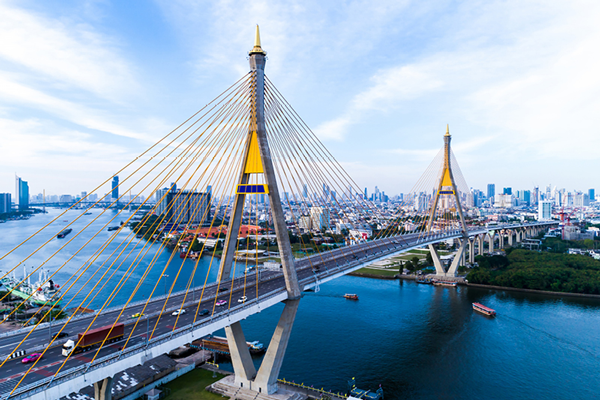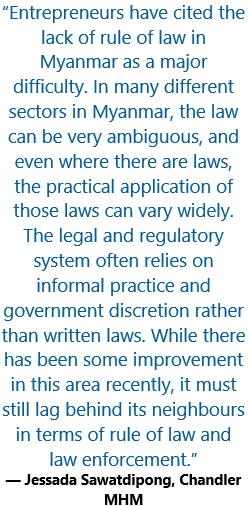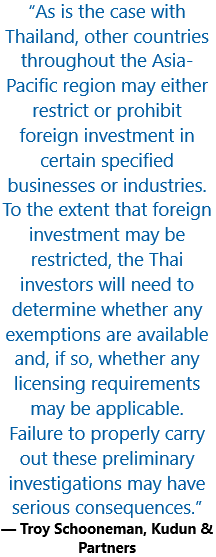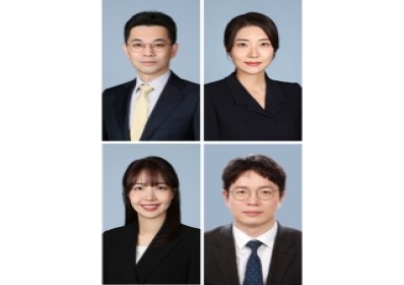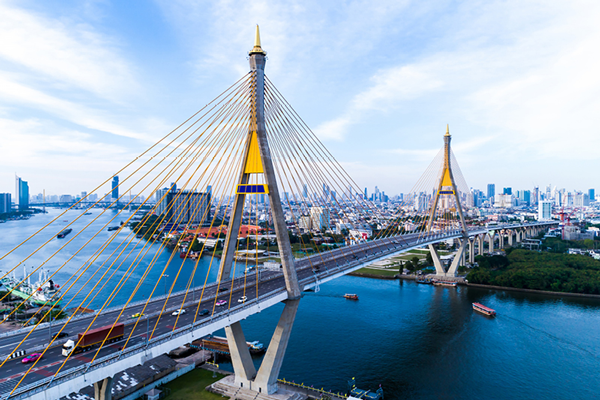
Backed by a strong baht and loaded with cash, Thai companies have ramped up acquisitions overseas, with neighbouring countries in the ASEAN region offering some of the most attractive targets. And while developing economies such as Vietnam, Myanmar and Cambodia offer exciting opportunities, those come with challenges as well, lawyers say.
In August this year, the Royal Thai Embassy in Yangon and the Thai Business Association of Myanmar (TBAM) hosted the Myanmar Insight Seminar 2019 in Bangkok. The goal? Encouraging Thai businesses to expand their investment in Myanmar.
Myanmar is not the only country seeking to encourage Thai investment – Vietnam and Cambodia are also competing options for cash-rich Thai companies which are blessed with a strong baht.
The ASEAN region is already Thailand's biggest export market, contributing 25 percent ($68 billion) of Thai export revenue, according to the Bangkok Post. This is more than double Thai exports to the Chinese market ($30 billion). And as of 2017, 214 publicly listed Thai companies were investing in the ASEAN, of which 161 were in Cambodia, Laos, Myanmar and Vietnam (CLMV).
“It’s obvious that Thai business is not limited to Thailand anymore, geographically. They are going outbound and this is the trend we have been seeing for four or five years. They are heavily investing especially in Vietnam, Myanmar and they are expanding in terms of scope,” says Panuwat Chalongkuamdee, partner at Weerawong Chinnavat & Partners.
And given that each market comes with its own set of legal and regulatory challenges, experienced lawyers are needed to smoothen the road ahead.
BIG HURDLES
Jessada Sawatdipong, senior partner at Chandler MHM Limited, says that there are a number of challenges experienced by clients accessing these markets, as Cambodia, Myanmar, Laos, Vietnam continue to refine and implement investment laws and policies.
Among the other significant difficulties faced by investors – several of which stem from bureaucratic issues, include “time, costs and procedures associated with starting a business, obtaining construction permits, registering property, and enforcing contracts,” he says.
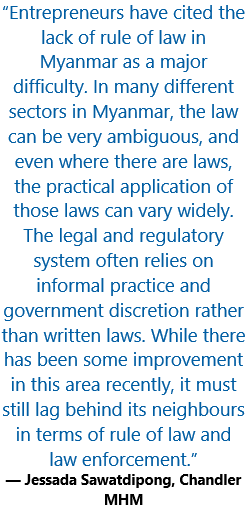 These are also further exacerbated by lack of development within Cambodia and lack of reliability of legal enforcement. “Poor infrastructure and high-energy costs (Cambodia’s electricity costs are among the highest in ASEAN). Disputes over land rights and limited enforcement of intellectual property rights also remain major concerns,” are also matter that clients should be aware of, Jessada warns.
These are also further exacerbated by lack of development within Cambodia and lack of reliability of legal enforcement. “Poor infrastructure and high-energy costs (Cambodia’s electricity costs are among the highest in ASEAN). Disputes over land rights and limited enforcement of intellectual property rights also remain major concerns,” are also matter that clients should be aware of, Jessada warns.
Additionally, “entrepreneurs have cited the lack of rule of law in Myanmar as a major difficulty. In many different sectors in Myanmar, the law can be very ambiguous, and even where there are laws, the practical application of those laws can vary widely. The legal and regulatory system often relies on informal practice and government discretion rather than written laws. While there has been some improvement in this area recently, it must still lag behind its neighbours in terms of rule of law and law enforcement,” Jessada adds.
Meanwhile, Vietnam is also going through a period of change, with evolving regulatory regimes and commercial law. This, “combined with overlapping jurisdiction among government ministries, often results in a lack of uniformity and consistency in government policies and decisions on commercial projects”, he notes.
These issues can often manifest in project timelines exceeding initial projections. Clients are also required to submit all paperwork in the Vietnamese language, with foreign paperwork being certified Vietnamese translations, which requires them to be notarised or certified by courts in the home country, and then authenticated by a Vietnamese embassy.
“The main challenges of doing business in Vietnam are inadequate infrastructure, lack of skills, opaque laws, slow judiciaries, and lack of adequate Intellectual Property Rights (IPR) enforcement. Despite recent improvements, administrative procedures are still complicated. Vietnam’s anti-corruption frameworks are reasonably comprehensive relative to the region, especially with recent updates to its corruption laws and policies,” Jessada says.
INVESTING SAFELY
Troy Schooneman, partner at Kudun & Partners, tells Asian Legal Business that the investment process is another area where lawyers play an important role, as Thai businesses involved in cross-border investment transactions will need to have a thorough understanding of foreign ownership restrictions that might apply to the business activity in which they wish to invest.
“As is the case with Thailand, other countries throughout the Asia-Pacific region may either restrict or prohibit foreign investment in certain specified businesses or industries. To the extent that foreign investment may be restricted, the Thai investors will need to determine whether any exemptions are available and, if so, whether any licensing requirements may be applicable. Failure to properly carry out these preliminary investigations may have serious consequences,” Schooneman says.
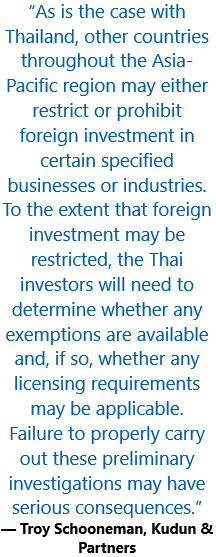 Additionally, it is “critically important” that Thai investors ensure that sufficient contractual protections are put in place when working with local partners, Schooneman notes.
Additionally, it is “critically important” that Thai investors ensure that sufficient contractual protections are put in place when working with local partners, Schooneman notes.
“This will normally take the form of a joint venture agreement. If the Thai investor is a minority shareholder in the joint venture company, it should ensure that the joint venture agreement contains adequate minority protection provisions, both at the shareholder and board of director levels, as well a workable mechanism for dealing with operational and management deadlocks,” he adds.
BOOTS ON THE GROUND
While lawyers can smooth many issues, some hurdles require local knowledge. Panuwat of Weerawong notes that for firms seeking invest in Vietnam or Myanmar, lack of ability to communicate remains an issue. Therefore, investors will often enter these markets along with a partner to ensure they are accompanied by someone with first-hand knowledge and in-depth understanding of the market.
He further adds that a local partner is also important when it comes to managing people – but it’s essential to find the right kind of partner. “They will seek our advice about how to identify if this business or partner is honest or not. For example, when you go to Myanmar, the first thing you have to check is if your partner is on a U.S. or EU government restriction list,” he says, adding that shareholding restrictions, pose another practical challenge.
“Many jurisdictions still have a restriction on shareholding by foreigners. Vietnam seems to be the most accommodating in terms of shareholding, and Myanmar is starting to open up. Myanmar is also opening up its retail and wholesale business, but with various conditions,” he notes.
While investors are used to weighing up such risks, in several markets they must carefully consider additional outlay too. “For example, in Myanmar, you need to put in a certain amount of capital into the country. It’s quite a significant amount if you want to try the market, you have to put in a large amount of money [at once], instead of gradually,” Panuwat says, explaining that for some businesses it’s too much and “doesn’t make sense”.
“Then in the country Myanmar, you’re also risking whether or not the money can be repatriated in the future – we don’t know if the government will change the regime. But those things can be mitigated through political insurance,” he notes.
Jessada of Chandler MHM has also noticed this challenge for his clients. “Another particularly burdensome regulation preventing entrepreneurship is the relatively high minimum paid-in capital requirement that applies when of the establishment of generic business operation – i.e. the standard amount that a foreign or domestic investor is legally required to deposit in a bank or with a notary before registration or up to three months following incorporation. Minimum capital requirements are associated with greater informality, and with firms operating without formal registration for long periods,” he says.
BRIGHT SPOTS
While Thai investors must navigate these roadblocks, ample opportunities continue to draw them into ASEAN. At the same time, this also produces work opportunities for their lawyers. Ever popular is M&A.
“Many of our clients are M&A entities,” says Panuwat. “So most of the time we’re involved at the time when they have to submit a bid, so they will engage us to help prepare for the bidding document. Then we need to provide advice on whether the acquisition is feasible, in terms of the intended foreign shareholding that they want. We then help them negotiate the deal, prepare the transaction documents, and then implement the transfer of ownership process,” he explains.
“We see both scope and scale M&A. Talking about legal perspectives when investing in other jurisdictions, I think Thai clients depend on legal advice to take them there and explore the legal terrain in each jurisdiction.
“Many clients, when they’re going to a new market, they don’t go alone, they will go in packs, and finding the partner both in partner and the local jurisdiction.”
Meanwhile, when it comes to areas of investment, Thai companies tend to invest in broad sectors such as oil and energy Panuwat adds – advising that clients continue to examine what strengths Thailand has at the moment, and to take note of high-profile corporates in Thailand in key industries.
But Thai investment also has a future further afield as investors launch into new markets.
“I think another opportunity for Thai businesses is business in the EU. Especially in the real estate sector. This is the right time for Thai businesses to go into the region because our currency is strong, and the downturn of the EU, Brexit, and the economic downtown, and on top of that, Thai businesses have so much liquidity,” he adds.
INTO THE FUTURE
While there is little doubt ASEAN will continue to court Thai investment, Thailand is also undergoing something of a transformation itself. In August, Thailand’s economic ministers revealed they were working on a “relocation package” to attract foreign companies looking to move factories due to the U.S.-China trade war. Targeting investors from China, Japan, South Korea, Taiwan and the U.S., Reuters reported that the package is designed to help the Board of Investment to achieve its target of $24.37 billion in overall investment pledges this year.
Additionally, in the first half of 2019, the total value of foreign investment applications more than doubled – led by Japan and China, Reuters found.
Panuwat agrees that factors such as the trade war will have an impact on Thailand soon. “In terms of Thailand inbound investment, the government is trying to attract the relocation of businesses from China or the U.S. into Thailand. We are competing with Vietnam – and that applies to Thai businesses as well. If they still have any connection with China or the U.S. and they want to relocate their businesses to a neutral country, or come back to Thailand, that’s key. Businesses are comparing to between going to Vietnam or Myanmar instead of Thailand,” he adds.
Considering the economic future of ASEAN, Panuwat says the region has a lot to look forward to. “ASEAN is unique. It’s loose, but there’s still unity,” he notes, adding that it’s an “environment where investment can prosper. It also attracts other key players and investors into ASEAN. And then if you consider the events in Hong Kong now… it’s opening a way … for Bangkok to be another finance hub,” he adds.
To contact the editorial team, please email ALBEditor@thomsonreuters.com.
